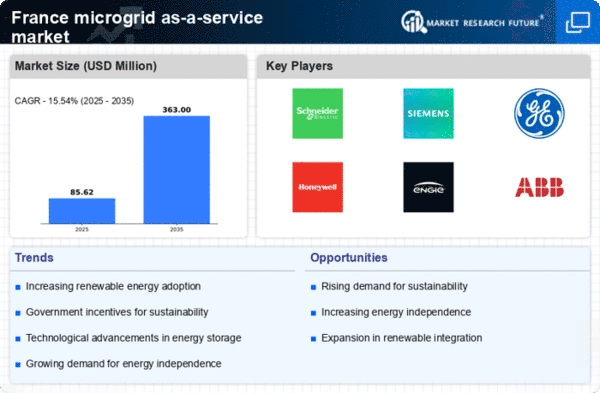Corporate Sustainability Initiatives
Corporate sustainability initiatives are significantly influencing the microgrid as-a-service market in France. Many companies are adopting sustainability goals that include reducing carbon footprints and enhancing energy efficiency. In 2025, it is projected that over 50% of large enterprises in France will have implemented sustainability strategies that incorporate renewable energy sources. This shift is prompting businesses to explore microgrid solutions as a means to achieve their environmental objectives. By investing in microgrids, companies can not only reduce their reliance on traditional energy sources but also enhance their brand reputation among environmentally conscious consumers. This growing trend towards corporate responsibility is expected to bolster the microgrid as-a-service market, as more organizations seek to align their operations with sustainable practices.
Increased Urbanization and Energy Demand
The rapid urbanization in France is creating a pressing need for innovative energy solutions, thereby impacting the microgrid as-a-service market. As urban populations grow, so does the demand for reliable and efficient energy systems. In 2025, urban areas are projected to account for approximately 80% of the total energy consumption in France. This trend necessitates the development of localized energy systems that can cater to the specific needs of urban communities. Microgrids offer a viable solution by providing tailored energy services that enhance reliability and reduce transmission losses. The increasing energy demand in urban centers is likely to drive investments in microgrid technologies, positioning the microgrid as-a-service market as a key player in addressing the challenges posed by urban energy consumption.
Government Incentives and Regulatory Support
Government incentives and regulatory frameworks play a crucial role in shaping the microgrid as-a-service market in France. The French government has implemented various policies aimed at promoting renewable energy and enhancing energy efficiency. For instance, subsidies and tax breaks for renewable energy projects have encouraged investments in microgrid technologies. In 2024, it was reported that government funding for microgrid initiatives increased by 25%, reflecting a strong commitment to sustainable energy solutions. Additionally, regulatory support for grid interconnections and energy storage systems has facilitated the deployment of microgrids across the country. This supportive environment is expected to drive the growth of the microgrid as-a-service market, as stakeholders leverage these incentives to adopt innovative energy solutions.
Rising Demand for Decentralized Energy Solutions
The microgrid as-a-service market in France is experiencing a notable surge in demand for decentralized energy solutions. This trend is driven by the increasing need for energy independence and resilience among consumers and businesses. As energy prices fluctuate, stakeholders are seeking alternatives that provide greater control over their energy sources. The French government has been promoting initiatives to support decentralized energy systems, which aligns with the European Union's broader energy strategy. In 2023, approximately 30% of energy consumers in France expressed interest in adopting microgrid solutions, indicating a shift towards localized energy generation and consumption. This growing interest is likely to propel the microgrid as-a-service market forward, as more entities recognize the benefits of tailored energy solutions.
Technological Integration and Smart Grid Development
The integration of advanced technologies into the microgrid as-a-service market is transforming energy management in France. The development of smart grid technologies, including IoT and AI, enables more efficient monitoring and control of energy resources. In 2025, it is anticipated that smart grid investments will account for over 40% of total energy infrastructure spending in France. This technological evolution allows for real-time data analysis and improved decision-making, enhancing the operational efficiency of microgrids. Furthermore, the adoption of energy storage solutions is becoming increasingly prevalent, allowing for better management of energy supply and demand. As these technologies continue to evolve, they are likely to drive the microgrid as-a-service market, offering innovative solutions to meet the energy needs of various sectors.
















